"What Hurts the Most" is a song written by American songwriter Jeffrey Steele and English songwriter Steve Robson. Originally recorded by country music artist Mark Wills in 2003 on his album And the Crowd Goes Wild, it was covered by Bellefire a year later. The first version to be released as a single was by pop singer Jo O'Meara in 2005, from the album Relentless. Later that year, country band Rascal Flatts covered the song as well, releasing it as the first single from the 2006 album Me and My Gang, topping the U.S. country and adult contemporary charts with it. German band Cascada later had international chart success with the song in 2007. It was also covered by Eden in 2008.
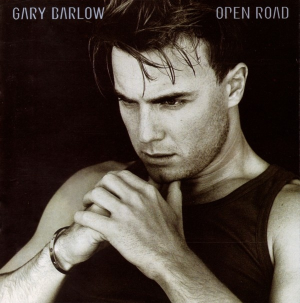
Open Road is the debut solo album by British singer-songwriter Gary Barlow. It was released by BMG and RCA Records on 26 May 1997.
"Bless the Broken Road" is a song that has been recorded by several American country music artists. Co-written by Marcus Hummon, Bobby Boyd, and Jeff Hanna in 1994, it tells how the journey through relationship heartbreak and disappointment was an important series of lessons along the broken road to finding one’s true love. It was first recorded by the Nitty Gritty Dirt Band in 1994, followed by Hummon on his 1995 album All in Good Time.
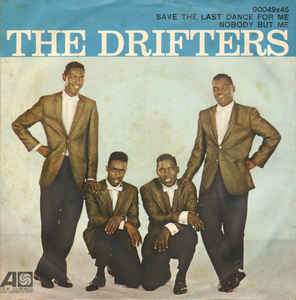
"Save the Last Dance for Me" is a song written by Doc Pomus and Mort Shuman, first recorded in 1960 by American musical group the Drifters with Ben E. King on lead vocals. It has since been covered by several artists, including Dalida, the DeFranco Family, Emmylou Harris, Dolly Parton, and Michael Bublé.

"How Am I Supposed to Live Without You" is a song co-written in 1982 by Doug James and Michael Bolton. The track was originally recorded by Laura Branigan in 1983, charting at number one in both the US and Canadian Adult Contemporary charts. Bolton later recorded his own version of the song that topped the US Billboard Hot 100 and became a worldwide hit.

"Right Here Waiting" is a song by American singer and songwriter Richard Marx. It was released on June 29, 1989, as the second single from his second album, Repeat Offender (1989). The song was a global hit, topping charts in many countries around the world, including Australia, Canada, Ireland, New Zealand, and the United States where it reached number one on the Billboard Hot 100. The same year, it was certified platinum by the Recording Industry Association of America (RIAA). It was the UK's most streamed love song on Spotify ahead of Valentine's Day in 2013 and has since been covered by many artists, including R&B singer Monica.
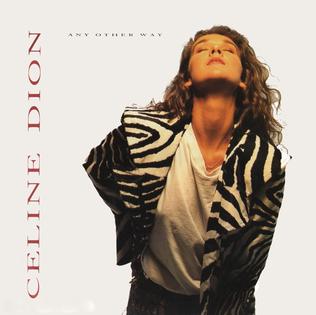
"(If There Was) Any Other Way" is a song by Canadian singer Celine Dion. It was included on her first English-language album, Unison (1990). "(If There Was) Any Other Way" was released by Columbia Records as the album's lead single in Canada on 26 March 1990. The next year, it was issued as the second single in other countries. The song was written by Paul Bliss, while production was handled by Christopher Neil.

"You Light Up My Life" is a ballad written by Joseph Brooks, and originally recorded by Kasey Cisyk for the soundtrack album to the 1977 film of the same title. The song was lip synced in the film by its lead actress, Didi Conn. The best-known cover version of the song is a cover by Debby Boone, the daughter of singer Pat Boone. It held the No. 1 position on the Billboard Hot 100 chart for ten consecutive weeks in 1977 and topped Record World magazine's Top 100 Singles Chart for a record 13 weeks.

"So Help Me Girl" is a song written by Howard Perdew and Andy Spooner and recorded by American country music singer Joe Diffie. It was released in January 1995 as the third single from his fourth studio album, Third Rock from the Sun (1994). The song reached number two on the Billboard Hot Country Singles & Tracks chart, where it debuted at number 59 for the week of February 4, 1995, and number 84 on the Billboard Hot 100.
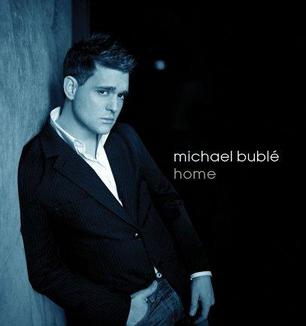
"Home" is a song by Canadian singer Michael Bublé, and released on January 24, 2005, as the first single from his fourth studio album, It's Time. The song was written by Bublé, along with co-writers Alan Chang and Amy Foster-Gillies. Bublé's version was a number-one single on the Adult Contemporary chart formats of both Canada and the United States, in addition to certifying platinum in both countries as well as finding chart success internationally. Following his original version in 2005, two cover versions were successful by other artists: one by Irish group Westlife in 2007, and one by American singer Blake Shelton in 2008.

"Pocketful of Sunshine" is a song by English singer-songwriter Natasha Bedingfield. It was recorded on 3 May 2006 and released on 15 January 2008 as the second single from her second North American studio album of the same title (2008). Bedingfield co-wrote the song together with American songwriter Danielle Brisebois and American musician and songwriter John Shanks; Shanks also produced the track as well as performing on most of the instruments present. Epic Records serviced the song to contemporary hit radios in the United States on 11 February 2008. It was not released in Europe until April 2011, when it was released as the lead single from her third European studio album Strip Me Away (2011).

Twelve Months, Eleven Days is the second solo studio album released by British singer-songwriter Gary Barlow. The album was released by BMG and RCA Records on 11 October 1999. It was to be Barlow's last studio album for 13 years until the release of Sing. Furthermore, this was his last full-length record up until the release of Since I Saw You Last.

"For All That You Want" is the second single from British singer/songwriter Gary Barlow's second studio album, Twelve Months, Eleven Days. The single was released on 27 September 1999. In 2003, footage of the music video was used in an Alton Towers advert, showing Gary and his friends driving bumper cars.
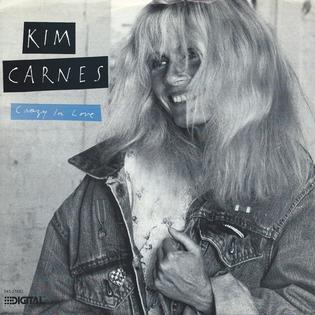
"Crazy in Love" is a song by songwriters Even Stevens and Randy McCormick; it was first recorded by Joe Cocker on his 1984 album Civilized Man. The song was covered by American pop artist Kim Carnes in 1988 and released as the second single from her album View from the House. Carnes' version peaked at number 13 on the Billboard Adult Contemporary chart and number 68 on the Billboard Hot Country Singles & Tracks chart.

English singer Gary Barlow has released six studio albums, eighteen singles, twenty-two music videos and five featured songs. Barlow has had fifteen number-one UK singles, eleven number-one albums and has written thirteen UK number-one singles, selling over 50 million records worldwide and over seven million concert tickets.

"50 Ways to Say Goodbye" is a song by American pop rock band Train. It is the second single from their sixth studio album, California 37 and is the fifth track on the album. It is considered to be adult contemporary pop radio music. It was released in the United States on June 11, 2012. It is their most recent top 40 hit, peaking at number 20 on the Hot 100. It was certified gold by the RIAA on September 20, 2012 and has since been certified triple platinum.
"Someday" is a song from Disney's 1996 animated feature film, The Hunchback of Notre Dame. It was written by composer Alan Menken and lyricist Stephen Schwartz and originally recorded by American singer and actress Heidi Mollenhauer in her film role as the singing voice of Esmeralda. It was one of three recordings, along with "In a Place of Miracles" and "As Long as There's a Moon", that were discarded during the storyboarding process to be replaced by "God Help the Outcasts." The codirectors Gary Trousdale and Kirk Wise both desired a quieter song for Esmeralda's scene inside the Notre Dame cathedral.

Michael Ross Pollack is an American songwriter and record producer. He has written songs for artists such as Miley Cyrus, Maroon 5, Justin Bieber, Selena Gomez, Katy Perry, Jonas Brothers, Beyoncé, Lizzo, Kelly Clarkson and many others. He achieved his first US Top 40 radio #1 in February 2020 with Maroon 5's "Memories", his second in February 2022 with Justin Bieber’s "Ghost", and his third in February 2023 with Miley Cyrus' "Flowers". He achieved his first Billboard Hot 100 #1 in January 2023 with Miley Cyrus' "Flowers".
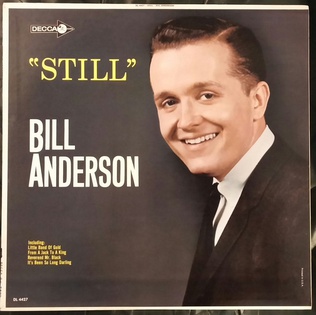
Still is a studio album by American country singer-songwriter Bill Anderson. It was released on June 17, 1963 on Decca Records and was produced by Owen Bradley. Still was Anderson's debut studio album as a recording artist after recording several singles for the Decca label. Two singles were included in the album. Its most successful was the title track, which became a crossover hit in 1963. It reached positions on the Billboard country, pop and adult contemporary charts. The album itself would also reach peak position on Billboard charts.
















